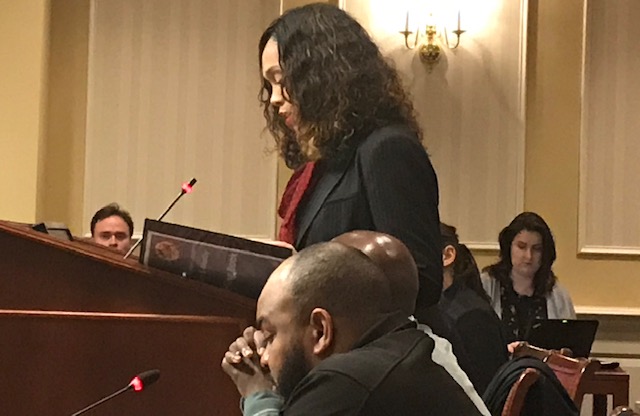@BryanRenbaum
[email protected]
Baltimore City State’s Attorney Marilyn Mosby came to Annapolis on Wednesday to voice her support for a bill that would require Maryland to pay certain individuals who have been wrongly convicted, sentenced or confined, or whose conviction or judgment has been overturned.
“This is a vital piece of legislation that seeks to ensure that those who have been wrongly accused and convicted are provided with the means to re-enter society and can have compensation and begin to alleviate the financial burden that that wrongful incarceration has placed on not only themselves but also their families,” Mosby said at a Senate Judicial Proceedings Committee hearing.
Five years ago, Mosby said, her office “began one of the first conviction integrity units in the entire state of Maryland.” The unit assesses “claims of innocence” and conducts “reinvestigation into those claims,” she said.
Mosby said the unit’s findings highlighted the need for her to support the legislation, she said.
“The need for this reform has become crystal clear to me after the work my office has done through our Conviction Integrity Unit — where, since the start of my administration, we have exonerated already nine individuals whose cumulative sentences…were more than 250 years in jail. …This bill sets the path to right a wrong — an egregious wrong — and at least repair some of the damage that’s been done to them.”
Lauren Libscomb, the division chief of Mosby’s Conviction Integrity Unit, described the challenges exonerated people face when they attempt to re-enter mainstream society.
“They have no identification, no Social Security card — without these, of course, they cannot get health insurance or a job. They need immediate mental health and medical treatment to cope and recover from the effects of incarceration.”
Lipscomb said other challenges include “managing anxiety related to crowds,” dealing with “loud noises” and “sudden movements” and “learning how to apply for a job.” All of these challenges are “overwhelming to the recently released exonerated person,” Lipscomb said.
Demetrius Smith relayed that he was convicted of murder in Baltimore when he was 24. Despite maintaining his innocence, he was sentenced to life plus 18 years for the 2008 slaying of Robert Long, 36. But after serving 5 years, Smith was exonerated when a federal investigation proved someone else had committed the crime, he said. Under current law, Smith said, he is not eligible for compensation because he did not meet either of the two criteria required for eligibility.
“Even though the real perpetrators have been convicted — I’m still not eligible for compensation. I wasn’t exonerated through the writ of actual innocence, so I’m out of luck. There are different ways that people can overturn their wrongful conviction.”
Under current law, the Board of Public Works is authorized to grant payments to people who been wrongly convicted, sentenced or confined, or whose conviction or judgment has been overturned — but it is not required to do so. However, the board may authorize those payments only to those whom the governor has pardoned or who have received a state’s attorney certification that says the conviction was made in error. Both dispositions are extremely hard to obtain. The board is comprised of the governor, comptroller and treasurer.
The legislation — SB0797 and HB0985 — would, according to its text, change a provision in state law to “require, rather than authorize, the Board of Public Works to pay certain compensation to a certain individual who has been erroneously convicted, sentenced, and confined on a finding of eligibility by an administrative law judge within 60 days after receiving the order….” It would authorize “an administrative law judge to issue a certain order of eligibility under certain circumstances” and would require “certain compensation made by the Board to be equal to a certain amount.”
Smith has started a landscaping business since being exonerated. He said compensation from the state could help him expand his business.




Recent Comments